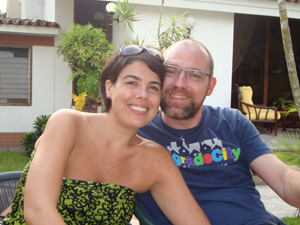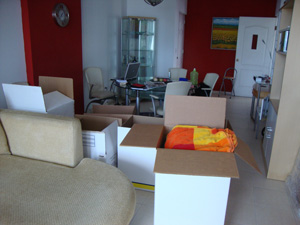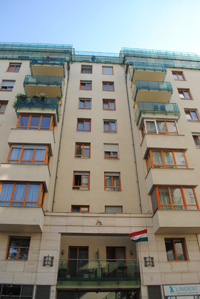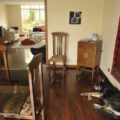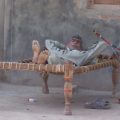My (short) experience trying to feel “at home”
I am a rookie to life as an expatriate. Although I have been away from my hometown more than once and, at different stages in my life (at 4 and 10 then later at 26 as a graduate student), my real life as an expatriate started quite recently. When I married 3 and a half years ago, I naturally followed my husband wherever his career would take us. I left my career, my family and friends. Life as I knew it had completely disappeared–forever!
Today, I live in Budapest.
This is my second destination, the first being Panama. How many more homes I shall have in the my future life as an expatriate is really up to fate! So far, both destinations have been very different in their geography, culture, climate and language. The personal circumstances that surrounded each move were also very different. The ensuing processes of feeling the need to be “at home” in each destination were diverse.
I felt lucky, though
Despite the differences between the two relocations, in both cases I was fortunate enough to cross paths with the right people. By the right people, I mean those that know everything there is to know to smooth the process of moving and who helped me adapt easily. While the welcomes were dissimilar, both countries did so with open arms.
The initial move
I left my hometown and my parents after 30 years, except for those 13 months when I left to study in 2005. The fear of uncertainty and the inevitable changes accompanied me. Without doubt it was difficult leaving “my home” (to which I now refer to as “my parents´ house”) to reach another “home”, a home that would be my husband’s and mine. A new adventure had begun. I was now a married woman. I had married a man from another country and with that, I had another culture to embrace too. We had a relatively short and quite unusual courtship, which led us back and forth between Panama and Lima. I left a lucrative job as a corporate lawyer knowing that the type of law I practiced could not be easily exported. The consequence of leaving my financial freedom behind was extremely difficult for me.
The first task in my life as an expatriate was to find work
It was very important to me. I was willing to do almost anything. I couldn’t see myself staying at home, doing nothing. It wasn’t until later in my life that I appreciated that people who stayed at home were fulfilling their lives in a different way. It was necessary for me however, at that time, to put all those years of study and work to good use. I also felt strongly that I had to maintain my economic independence to give me peace of mind. My life had taken on so many changes in such a short space of time I needed to cling onto something that was familiar to me, so I opted to work as soon as I could.
I was lucky enough to find a job within the first week of my arrival
It certainly wasn’t the dream job I had secretly pictured. It didn’t matter though. It was a job all the same even if it paid badly. I worked all the time I lived in Panama and the job improved to the point that I enjoyed it immensely. It had given me the independence to gain my own personal confidence as a newlywed who had followed her new husband. It was also the type of job that allowed me to learn all about the city. In a sense it was a Godsend as I learned quickly where things were, what events were taking place, which were the trendy restaurants. The job had afforded me the immediate opportunity to become familiar with a new city and I knew as much about it as a local did.
During my time in Panama I met many lovely people and my husbands friends soon became mine, but if I were to I think about it, the key to my early (and easy) adaptation, was my job. In a nutshell, my work opened the doors of the city. At last I had some continuity: everything in my life had changed but I was still an independent woman. Panama was now my home, not only because of my husband, but because of my job too.
We then moved to Budapest
after being married a while and any newlywed fears I may have harbored at the beginning, when we first moved to Panama, had disappeared once we had settled down to a more confident relationship as husband and wife. It had been good for me to work but now, even though it was still important to me, being economically dependent on my husband wasn’t as bad as I had first thought in those early days of marriage. Don’t get me wrong, I still wanted to work but the type of residence permit I had in Bolivia excluded me from any paid vocation. My world did not crumble around me as it may have in the early days in Panama. My only distraction really was how was I now going to replace all those things a paid job had given me as an expatriate in the past.
The real problem this time was a different one. We didn’t know anyone at our new destination and without a job it was going to be difficult learning about a new city and making new friends.
It was at this moment that the “fun” really began
I needed to create a new home, build a life from scratch and with no job any introduction to the local lifestyle would have to be built upon my own experiences. I realized all of this after two months, when nothing much had happened. One day, I found myself all alone when my husband went traveling for his work – it was then I fully understood what it was to have a life as an expatriate. I had to start taking control of my (new) life. I wanted a network of friends, a sense of belonging to a city and knowing all of its more hidden places. I wanted to know where we could eat well and at which restaurants, to know my way around a new city, to have a friend I could call at any time. No one was going to come knocking at my door so I turned to the internet to research everything I could. I discovered and learned about expatriate groups, Spanish speaking groups, anything that I could join that would help to make me feel a part of something that could possibly open doors for me so that I could explore my new city. I started to go out with a new found confidence, pushing my own boundaries and introducing myself “Hi, I’m new here and I need to create myself a home.”
 The rest to me is history
The rest to me is history
I must say that those first steps out into a new world trying to find people who would make me feel at home were complicated. I caused these complications myself. I was lucky again to find some great people who I not only met quickly but who are now also among my best friends in Budapest. I admit it was difficult for me. I had never done anything like this before. I hated showing up and introducing myself in groups of strangers, because I never liked being the new one. But the important lesson I learned from this is that we ourselves set our own limitations. A little effort is all that’s required to break free and once accomplished the difference between feeling alone and starting the process that leads you to learning quickly about your new home is a piece of cake.
My two destinations, Panama and Budapest, had their differences but they also had a great deal in common. Firstly there are things that give continuity to my life and that I actually consider important elements in the process of building a home. There are the obvious physical objects that accompany us wherever we go; pictures, ornaments, books, albums of our marriage, a stuffed animal that my husband gave me when we were dating, my mini rice cooker that I wouldn’t be without, the collection of cow-shaped magnets that we have on the fridge, the souvenirs that we bought on each trip, all those things that, although put in different places, are always there with us and will always be a part of our house and home.
Secondly, the other essential element, which sometimes isn’t always as easy to conjour up – is the right attitude. I think it’s important to try to see things with an open heart and a positive mind. My personal strategy is to take the best of what you are given, to enjoy and live with enthusiasm, the good and the not so good that each destination has to offer. It is exactly this last thought that is helping me to survive the -20 degrees of the European winter! One must endeavor to make a home with little. And at the end of the day, home is really where your family is.
My experience above, is how I feel today about being as an expatriate. Who knows how I will feel in a few years to come especially when children come along. I may feel completely different and no doubt they will too. I wonder how I will convey to them where they come from, where their roots are. That is another story in itself, one I hope I can tell later.

